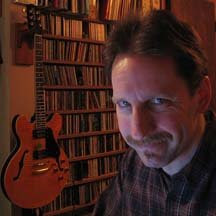Wednesday, September 7, 2011
Have you noticed?
Sunday, August 21, 2011
High concept for my NEXT next project
Thursday, November 5, 2009
Begining lead guitar
Just work the key signature in the correct major or minor pentatonic scale and you'll sound like a rockin' guy. Don't play minor pentatonics over major key chord progressions. Don't play the relative major over minor progressions.
To which he replied:
I already know pentatonics, guys. I just remember sitting in an audience at watching a guy noodle through pentatonics and thinking "damn, he's ruining the song"To which I replied:
He was probably playing the wrong pentatonic scale.A lot of guys focus on the minor pentatonic, because its a close relative of the blues scale. That's more or less okay for a I-IV-V blues progression, but if the chord progression is more advanced, then there's going to be problems.
For instance, an A minor pentatonic will be a disaster on an A major progression. For an A major progression, you can just drop to an F# minor pentatonic, which is more closely related to an A major scale.
As you get more into the chord progressions of the songs, you can start incorporating pentatonic scales based on the root of the relative Dorian or Mixolydian modes. For instance, a C minor progression can be approached with a D minor pentatonic or G minor pentatonic.
Friday, March 6, 2009
Technology and Technique
Had a recent “conversation” on another website with a musician who was unhappy with the vocal recordings he was making. On reflection, what he is doing is to me an indication of what I feel is “wrong” with many current uses of technology in music.
In the course of the discussion, this guy mentioned that he preferred the way his old cassette recording sounded as compared to his modern digital recordings. The facts are that his old recordings were a microphone plugged into a tape recorder. His new recordings are using a digital audio recording computer program, and he now has access to all kinds of tools (EQ, compression, reverb, etc.) that he didn’t have in the old days.
The problem seems to be that he doesn’t really know how to use these tools that he now has available. By way of using them too much, he actually damaged the sound of his music. He felt like the tools were there, he ought to use them. The fact that he didn’t understand how they worked, or what his recordings really needed, had no impact on his decisions. Is it any wonder that he didn’t like the results?
My response to this situation is that technology is just another tool, with which you must apply technique to get the best results. A new tool will not help you if you don't know how to use it.
Thursday, November 20, 2008
Listening Beyond the Guitar
For the lead guitar player, horn players are an obvious choice, because of the single note nature of their instruments. Trumpet players, saxophone players, all the wind instruments have their natural tendencies which are different from the guitar. Learning from the great players on those instruments will expand your playing beyond the fretboard.
For the composer in you, listening to writers that do not begin with a guitar in their hand will lead you towards new chord progressions, new chord voicings, and new rhythms.
Suggested listening: Miles Davis, Cannonball Adderly, Duke Ellington, Charles Mingus.
Friday, October 3, 2008
The essence of music
Actually, all music is about connecting emotionally through melody, harmony, and rhythm. Different melodies require different approaches to playing the instrument, but the hardest part is connecting emotionally with the listener through the shared experience of the music.
If you are thinking "I'm shredding up and down the fourth mode of a G melodic minor scale" or "I'm arpeggiating the upper structure triad of available tensions to the C major 7 chord", you are probably not connecting to the music emotionally, to say nothing of connecting with the listener.
Monday, September 15, 2008
Welcome to the world, blog
My feeling is that a lot of guitar players fall into doing things with a guitar oriented mindset, instead of a broader musical and artistic mindset. I'll be writing about how to make yourself a better guitar player by using music theory, and other concepts not specific to only guitar.
Hopefully I will keep you readers and myself exploring music, breaking out of ruts, and playing better on stage and in the studio.
